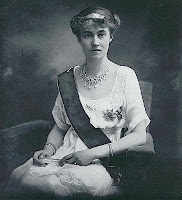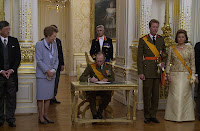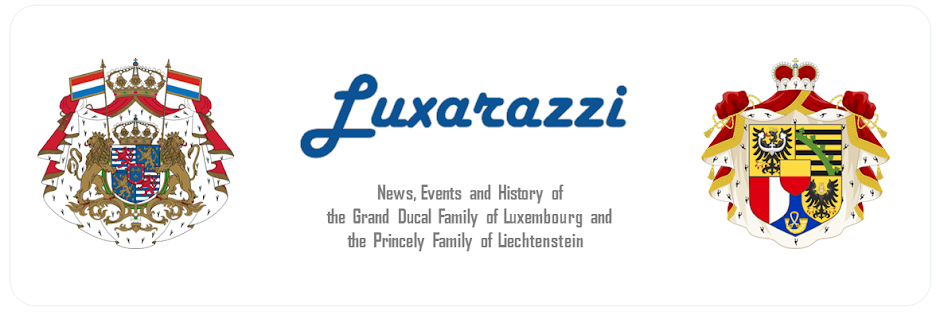In the light of the recent events in the Netherlands - earlier today Queen Beatrix has announced that she will abdicate and that the Prince of Orange will become King of the Netherlands on 30th April - we will have a look at similar events in the Grand Duchy.
Queen Beatrix's abdication follows the example set by her mother and grandmother, so it can be regarded as something of a tradition. A tradition that does not only exist in the Netherlands but in another country ruled by another branch of the House of Nassau, Luxembourg.
Neither in Luxembourg nor in the Netherlands abdication has quite the same connotation like it has in most other European monarchies. Over the past century or so, it has become something like a tradition for the head of state to step down at one point and to hand over their powers to their heir. It is not seen as a shocking and profound abandonment of one's royal duties but rather a very normal thing to trustingly hand over one's power to a new generation.
It certainly did not start out this way when the very first abdication in the House of Nassau-Weilburg happened in 1919.
Seven years earlier, Grand Duchess Marie-Adelaide had ascended to the throne at the tender age of 17 upon her father's death. From the very beginning she had done something that both her father, Grand Duke Wilhelm IV, and her grandfather, Grand Duke Adolph, had avoided - to mingle in politics. She had not been trained by her father in statecraft as he had been ill for a very long time. This, combined with the young Grand Duchess's strong Catholic faith, often led to clashes between her and the government as well as the political scene as a whole.
Even though Grand Duchess Marie-Adelaide carefully kept within the boundaries created by the constitution, her enemies, who often were also against the church, tried to take advantage of her lack of experience to create sentiment against her. The outbreak of the First World War and the following occupation of Luxembourg by German troops did not help the cause of the Grand Duchess either.
After initially having protested against the occupation, the Grand Duchess had tried to keep Luxembourg's neutrality throughout the War. After it's end, she was accused of having collaborated with the Germans. The perception of the Grand Duchess Marie-Adelaide as "pro-German" made her unpopular both within the population as well as on political level. On January 14, 1919 she gave in to the national and international pressure by abdicating from the throne and handing over powers to her younger sister, who would one day abdicate under very different circumstances.
[More on Marie-Adelaide's life in one of our future editions of Luxarazzi 101, a post about her is currently in the works.]
After her sister's abdication, Grand Duchess Charlotte's reign was off to a rough start as she had to face a referendum about the future of the Grand Duchy. In September 1919, 77.8 percent of the Luxembourgish population voted for the continuation of a Grand Ducal monarchy with Charlotte as head of state.
The new Grand Duchess decided not to meddle in politics - much of the power her sister still had, had been taken from the head of state due to an amendment of the constitution anyway - and over the next decades she would become a very much beloved figure. During the Second World War she became strong symbol for national unity, resistance and freedom.
On April 28, 1961, Grand Duchess Charlotte appointed her oldest son, then Hereditary Grand Duke Jean, Lieutenant Representative. While the Grand Duchess remained the nominal head of state, the Hereditary Grand Duke assumed most of the constitutional power. On May 4 that same year, he took the oath.
After having reigned for 45 years, she signed the declaration of abdication in which she renounced the Crown of the Grand Duchy in favour of her oldest son Jean on November 12, 1964.
Later on November 12, Grand Duke Jean took the oath as the new Grand Duke in a solemn ceremony at the Chamber of Deputies.
A very similar pattern can be found in the events leading up to Grand Duke Jean's abdication in 2000. On March 4, 1998, the then Hereditary Grand Duke Henri was appointed Lieutenant-Representative by his father.
About one and a half years later, Grand Duke Jean announced his intention to abdicate in favour of his eldest son on December 24, 1999. That day a special meeting of the parliament had taken place in which prime minister Jean-Claude Juncker had announced the Grand Duke's decision. Grand Duke Jean commented on the matter during his annual Christimas speech as following,
The actual abdication was delayed due to car accident of Prince Guillaume and Princess Sibilla in which the prince was seriously injured and remained in a coma for three weeks.
On October 7, 2000, Grand Duke Jean eventually signed the Grand Ducal Abdication Decree at the Grand Ducal Palace and thus handed powers over to his oldest son.
The first article of the decree states:
Queen Beatrix's abdication follows the example set by her mother and grandmother, so it can be regarded as something of a tradition. A tradition that does not only exist in the Netherlands but in another country ruled by another branch of the House of Nassau, Luxembourg.
Neither in Luxembourg nor in the Netherlands abdication has quite the same connotation like it has in most other European monarchies. Over the past century or so, it has become something like a tradition for the head of state to step down at one point and to hand over their powers to their heir. It is not seen as a shocking and profound abandonment of one's royal duties but rather a very normal thing to trustingly hand over one's power to a new generation.
It certainly did not start out this way when the very first abdication in the House of Nassau-Weilburg happened in 1919.
| Grand Duchess Marie-Adelaide |
Even though Grand Duchess Marie-Adelaide carefully kept within the boundaries created by the constitution, her enemies, who often were also against the church, tried to take advantage of her lack of experience to create sentiment against her. The outbreak of the First World War and the following occupation of Luxembourg by German troops did not help the cause of the Grand Duchess either.
After initially having protested against the occupation, the Grand Duchess had tried to keep Luxembourg's neutrality throughout the War. After it's end, she was accused of having collaborated with the Germans. The perception of the Grand Duchess Marie-Adelaide as "pro-German" made her unpopular both within the population as well as on political level. On January 14, 1919 she gave in to the national and international pressure by abdicating from the throne and handing over powers to her younger sister, who would one day abdicate under very different circumstances.
[More on Marie-Adelaide's life in one of our future editions of Luxarazzi 101, a post about her is currently in the works.]
 |
| Grand Duchess Charlotte in 1919 |
The new Grand Duchess decided not to meddle in politics - much of the power her sister still had, had been taken from the head of state due to an amendment of the constitution anyway - and over the next decades she would become a very much beloved figure. During the Second World War she became strong symbol for national unity, resistance and freedom.
On April 28, 1961, Grand Duchess Charlotte appointed her oldest son, then Hereditary Grand Duke Jean, Lieutenant Representative. While the Grand Duchess remained the nominal head of state, the Hereditary Grand Duke assumed most of the constitutional power. On May 4 that same year, he took the oath.
| Then Hereditary Grand Duke Jean becomes his mother's Lieutenant Representative (Photo: Photothèque de la Ville de Luxembourg) |
"I feel I have reached the age to retire, and I think that Jean is the age to take over. After all, I am 68 now."Maybe she had not expected to reach the age she eventually reached. Had Grand Duchess Charlotte not abdicated and reigned until her death, she would have reigned for a total of 66 years and 173 days.
Later on November 12, Grand Duke Jean took the oath as the new Grand Duke in a solemn ceremony at the Chamber of Deputies.
A very similar pattern can be found in the events leading up to Grand Duke Jean's abdication in 2000. On March 4, 1998, the then Hereditary Grand Duke Henri was appointed Lieutenant-Representative by his father.
About one and a half years later, Grand Duke Jean announced his intention to abdicate in favour of his eldest son on December 24, 1999. That day a special meeting of the parliament had taken place in which prime minister Jean-Claude Juncker had announced the Grand Duke's decision. Grand Duke Jean commented on the matter during his annual Christimas speech as following,
"I'm deeply convinced that it is a wise decision to retire from the business of state after 35 years of reigning on the eve of a new millenium."
 |
| Grand Duke Jean signs the abdication decree (Photo: SIP) |
On October 7, 2000, Grand Duke Jean eventually signed the Grand Ducal Abdication Decree at the Grand Ducal Palace and thus handed powers over to his oldest son.
The first article of the decree states:
Nous renonçons à la Couronne du Grand-Duché de Luxembourg en faveur de Notre Fils bien-aimé, le Grand-Duc héritier HENRI.
(We renounce the Crown of the Grand Duchy of Luxembourg in favour of Our dear son, the Hereditary Grand Duke HENRI.)The second article deals with the procedure.
Following the signing of the decree, prime minister Juncker held a speech in which he paid tribute to both Grand Duke Jean and Grand Duchess Joséphine-Charlotte.
 |
| Grand Duke Henri is sworn in (Photo: SIP) |
"I swear to observe the Constitution and the Laws of the Grand Duchy of Luxembourg, to maintain the national independence and integrity of the territory, as well as public and individual liberties."
Afterwards, he delivered the enthronement speech. (You can find an English version here.) The event was attended by members of the Grand Ducal Family as well as Queen Beatrix of the Netherlands and King Albert II and Queen Paola of the Belgians.
After the ceremony at the Chamber of Deputies, the new Grand Duke Henri, Grand Duchess Maria-Teresa and their children walked back to the palais where they appeared on the balcony together. During the course of the day another few events like a church service as well as receptions took place.
Once the time comes, we can expect similar things to happen on the day and in the lead up to Hereditary Grand Duke Guillaume's accession to the throne.

No comments:
Post a Comment